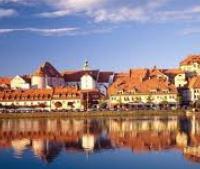
Primus Inter Pares
This is how the German team must have felt after winning the prestigious European Team Competition. I am a kind of breaking the chronological turn of events, but so be it! What these players did was surprising, exceptional and thrilling. After all, this is not soccer, where the country is one of the indisputable leaders in the world, and one of the main favourites for the coming European Championship, but chess. And they were only the tenth highest-rated team in Porto Carras, Greece at the start of the event. In front of them were the mighty Russians, the Olympic Champions from Ukraine, the World Champions Armenia, and many more decent teams. But Germany succeeded with a very strong team spirit. A couple of facts speak for their team abilities- all of the players ended up on a positive score, and they won the last three decisive matches by a narrow margin 2.5-1.5. In a tournament where the team point matter, this is the sweetest win. In all these matches the Germans were underdogs, and a different player won a game to secure the overall win!
The open section this year was indeed fascinating, with many twists, and each and every round had a different leader. England, France, Bulgaria, Azerbaijan, Armenia, none could ever predict who would lead the race on the coming day.
The elo favourites Russia and Ukraine met in round five on board number…five and this meant that the tournament would be practically over after that round for one of the teams (or both). Ukraine who lost in a crushing manner the round before against Germany (0.5-3.5) lost that match too, and registered one of their most painful performances ever. Two years ago, without Ivanchuk and Ponomariov in their squad, they were third, and now only fifteenth. Yes, this championship proved that there are no longer weak teams, and that anyone can beat anyone.
Russia was also out of the contest for the medals in round six when they lost their second match against the future silver medalists Azerbaijan (Svidler lost a most promising position against Radjabov). In the meanwhile Bulgaria stayed firmly on the top, and only the disastrous final round (0-4 against Hungary-who took bronze thanks to this win) deprived us of the medals. It is a shame as we managed to defeat both Russia, and the future champs, but nevertheless could not even make it to the top six.
France won the unofficial prize of the event for fair play. In their match against Azerbaijan they offered a draw, after spotting that Vugar Gashimov was not feeling well (due to high blood pressure). Azerbaijan then won against Bulgaria, and led the race before the last but one round, only to give away the leadership after losing to Germany (Naiditsch won as Black against Radjabov).
Before the final round it seemed like the new saying “Everyone plays, Armenia wins in the end” was about to be repeated. The Armenians and Germans were leading together, but Professor Elo was definitely betting on the former team. It all started with a quick draw on board one Naiditsch-Aronian, and soon after the second white colour of Germany was neutralized. However, the tournament was to be decided by the black pieces:
The German victory is fully deserved. We should give credit to their second, GM Rustam Kasimdzhanov, who was highly praised by all the team members.
I appologise for spending far less space on the ladies' event where everything was decided with a round to go. The Russian girls played fantastically, and allowed only one team draw throughout the event. Special attention should be paid to the performances of Tatiana Kosintseva and our own Natalia Pogonina (who has also provided a reportage on this event)! Bronze was taken by Georgia, and the silver, by the pleasant surprise- Poland. Here is the decisive silver game fragment:
Here are a couple more last round beauties:






